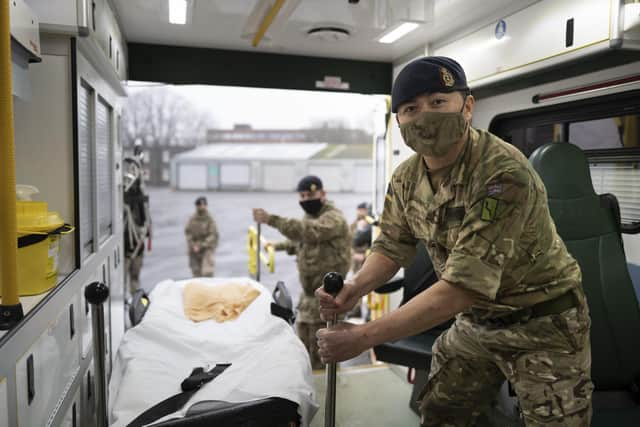Covid Scotland: NHS must be ‘creative’ to ease staffing shortages, says ex army head of medical services who used deep-sea divers to staff intensive care
Michael von Bertele, who retired from the army after 35 years in 2012, is a non-executive director of Salisbury NHS foundation trust.
He co-ordinated a scheme that brought deep-sea divers into short-staffed intensive care units during the early months of the Covid-19 pandemic.
Advertisement
Hide AdAdvertisement
Hide AdThe divers, who are medical technicians used to supporting offshore workers or deep-sea explorers, had the skills and experience to work alongside nurses despite not being registered health professionals, Dr von Bertele said.


While this was a short-term arrangement, Dr von Bertele said the same concept of thinking about workforce and bringing in new ideas could be applied to current short and long-term pressures on the NHS.
Speaking ahead of the World Extreme Medicine conference in Edinburgh today, he said the biggest challenge facing the NHS is staffing.
“Across the NHS we’ve faced real challenges with our nursing workforce because they've been on the front line, and they’ve had to adapt the way they work,” he said, citing exhaustion of staff after working through the pandemic and high levels of sickness from stress, Covid-19 or family members requiring care due to Covid-19.
“We have been overwhelmed by events and there just isn't a workforce.”
Added pressure is put on staff by high numbers of people visiting or remaining in hospital unnecessarily, Dr von Bertele said.
This applies to people visiting A&E with issues which should be dealt with at their local GP practice, or elderly people who cannot be discharged as there is no social care plan in place for them.
The NHS “certainly needs to be more creative”, Dr von Bertele said.
Advertisement
Hide AdAdvertisement
Hide AdThis applies to short-term measures such as the diver pilot scheme, but also to long-term staffing shortages.
“There are lots of novel ways of looking at the workforce, but at the moment we’re just stuck in the old way of doing it,” he said.
“When we built the Nightingale hospital it was blindingly obvious to me as a military clinician that we would not have the staff to run them. The government bought 30,000 ventilators, but they did not buy 60,000 intensive care nurses to run them.
“What we were looking at was ‘how can you run a unit with different workforce?’ And that's why we hit on the diver medical technicians.”
He added: “I have a military background and we spend an enormous amount of time both across the army and in the military health service in workforce planning.
“It’s a strategic game where you look ahead ten to 20 years and say ‘what is the demand, what are we trying to do, and who do we need to employ to do it?’
“If we need to employ them, where will we find them, how will they be trained, and how long will it take?’ There just isn't an overall view of what the country needs to to deliver the health service we claim to want.”
A message from the Editor:
Thank you for reading this article. We're more reliant on your support than ever as the shift in consumer habits brought about by coronavirus impacts our advertisers.
If you haven't already, please consider supporting our trusted, fact-checked journalism by taking out a digital subscription.
Comments
Want to join the conversation? Please or to comment on this article.
